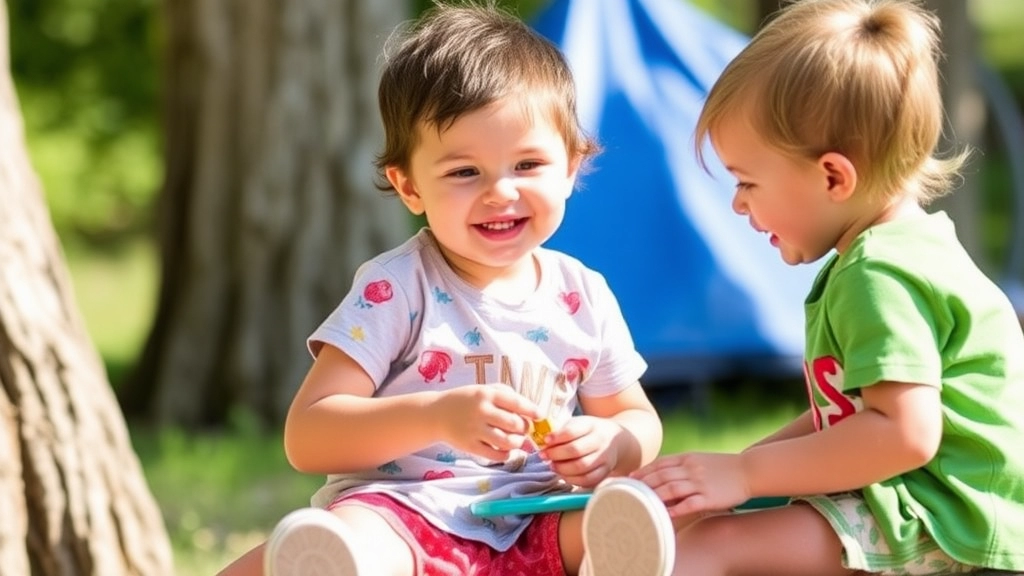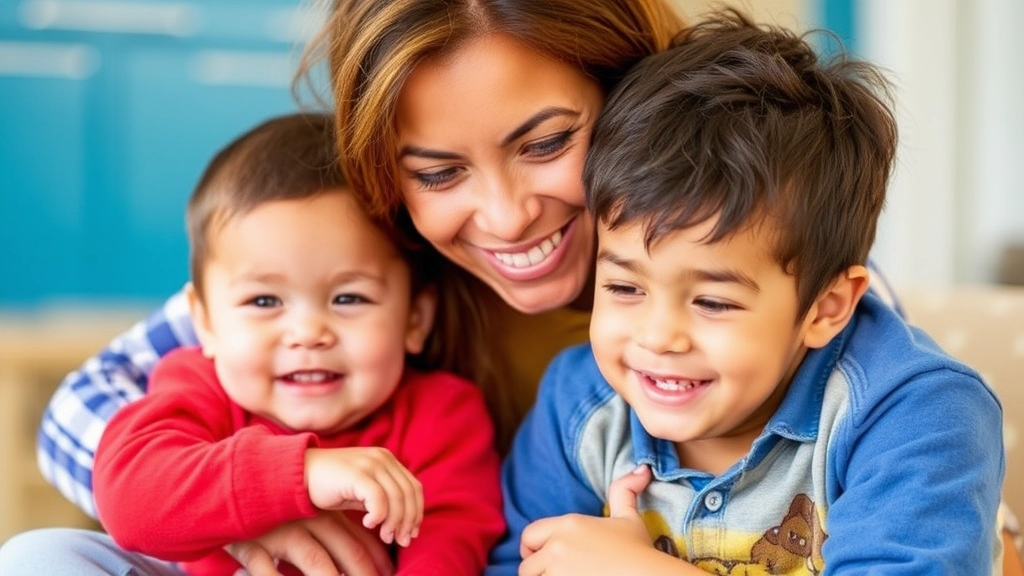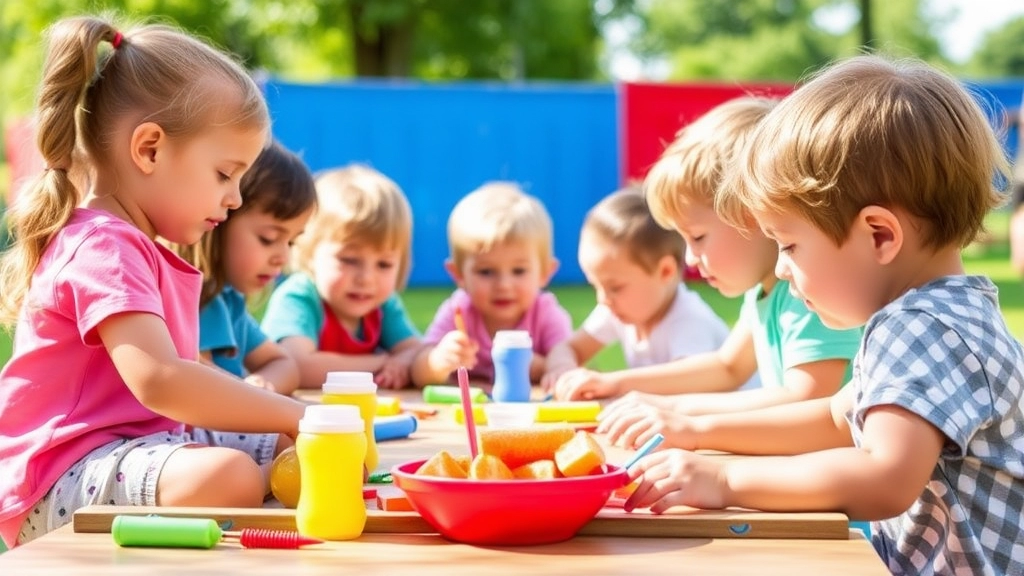Are You Considering a Summer Camp for Your Preschooler?
Are you considering a summer camp for your preschooler but unsure if it’s the right choice? Let me take you on a journey through the incredible benefits and options available, making your decision easier. From social skills to physical activity, summer camps offer a rich blend of fun and learning that’s hard to beat.
Exploring Summer Camps
In this article, we’ll explore the various types of summer camps for preschoolers, how to choose the right one, and the exciting activities they offer. We’ll also cover essential topics like safety, staff qualifications, and cost considerations. Plus, hear real stories from parents who’ve been there, done that, and loved it.
Ready to Dive In?
Let’s make this summer unforgettable for your little one!
Benefits of Summer Camps for Preschoolers
Ever wondered if summer camps are worth it for your little one? Let’s dive into the real benefits of summer camps for preschoolers. Trust me, there’s more to it than just keeping them busy.
Social Skills and Friendships
One of the biggest perks of summer camps is the social aspect. Preschoolers get to:
- Make new friends: Meeting kids outside their usual circle helps them learn social skills.
- Teamwork: Activities often require working together, fostering a sense of community.
- Communication: They get better at expressing themselves and understanding others.
Independence and Confidence
Summer camps are a great way for preschoolers to gain a bit of independence. They learn to:
- Make decisions: Whether it’s choosing an activity or solving a problem, they get a taste of making their own choices.
- Build confidence: Successfully completing tasks boosts their self-esteem.
Physical Activity
With so much screen time these days, physical activity is a big deal. Camps offer:
- Outdoor play: Running, jumping, and exploring nature.
- Structured sports: Learning the basics of games and sports.
- Motor skills: Fine-tuning their coordination and balance.
Creativity and Learning
Camps aren’t just about play; they’re a fantastic learning environment too. Preschoolers can:
- Explore new interests: From arts and crafts to science experiments.
- Problem-solving skills: Engaging in activities that challenge their thinking.
- Imagination: Creative play fosters innovation and curiosity.
Emotional Growth
Let’s not forget the emotional benefits. Camps help kids:
- Manage emotions: Being away from home can teach them to handle separation.
- Resilience: Dealing with new experiences and sometimes even small setbacks.
Real Stories, Real Benefits
Take it from Sarah, a mum of a four-year-old. She was unsure about sending her daughter to summer camp but decided to give it a shot. “I was amazed at how much she grew in just a few weeks. She came back more confident and couldn’t stop talking about her new friends.”
Quick Recap
- Social Skills: Making friends, teamwork, communication.
- Independence: Decision-making, confidence-building.
- Physical Activity: Outdoor play, sports, motor skills.
- Creativity: Exploring interests, problem-solving, imagination.
- Emotional Growth: Managing emotions, building resilience.
So, are summer camps worth it for preschoolers? Absolutely. They offer a blend of fun and learning that can set the stage for future success. Whether it’s making new friends or discovering a new passion, the benefits are clear. For more ideas on keeping your little ones engaged, check out our summer camp craft ideas for kids. And if you’re ready to start planning, don’t miss our summer camp packing list essentials.
Types of Summer Camps for Preschoolers

Wondering what type of summer camp will be best for your preschooler?
You’re not alone.
Choosing the right camp can feel like a big decision.
But don’t worry, let’s break it down.
Day Camps
Day camps are the most common type.
They run during the day and your kiddo comes home in the evening.
Perfect if you want to keep evenings family-focused.
Benefits:
- Keeps daily routines
- Easier on the budget
- Great for first-time campers
Specialised Camps
Got a little artist or a mini scientist?
Specialised camps focus on specific interests like art, science, or sports.
Benefits:
- Fosters specific skills
- Keeps kids engaged and excited
- Builds confidence in their interests
Nature Camps
Nature camps are all about the great outdoors.
Think exploring, hiking, and learning about the environment.
Benefits:
- Promotes physical activity
- Teaches about nature
- Unplugs kids from screens
Sports Camps
If your preschooler has endless energy, sports camps might be the ticket.
From football to gymnastics, there’s something for every active kid.
Benefits:
- Improves physical fitness
- Teaches teamwork
- Boosts social skills
Creative Camps
These camps are all about creativity.
Think arts and crafts, music, and drama.
Benefits:
- Encourages self-expression
- Develops fine motor skills
- Enhances imagination
Choosing the Right Camp
Still unsure which camp to pick?
Consider these:
- Interests: What does your child love?
- Schedule: What fits your family’s routine?
- Budget: What can you afford?
Ready to choose the perfect summer camp?
You’re on the right track.
Choosing the Right Summer Camp for Your Preschooler
Choosing the right summer camp for your preschooler can feel like a big decision, right? You’re probably wondering, âHow do I know which one’s best?â Let’s break it down.
What to Consider
Location and Convenience
- Proximity: Is it close to home or work?
- Transport: Do they offer pick-up and drop-off services?
Camp Focus
- General vs. Specialised: Are you looking for a general camp or one with a specific focus like arts or sports? Consider exploring fun summer camp crafts for kids to enhance their creative experience.
Schedule and Flexibility
- Full-day or Half-day: What suits your child’s routine better?
- Duration: Are you looking for a week-long camp or something that runs all summer?
Cost and Value
- Budget: What’s your budget?
- Inclusions: Does the fee include meals, materials, and activities?
Real Concerns
You might be worried about safety and the quality of the staff. Totally normal. Here’s what I’d look for:
- Staff Qualifications: Are the staff trained in early childhood education?
- Safety Protocols: Do they have clear safety measures and first-aid training? Understanding essential guidelines for safety can be beneficial.
Personal Stories
I remember when I was choosing a camp for my little one. We wanted something close by but also fun and engaging. We ended up picking a camp that had a mix of art and outdoor play. It was a hit!
Making the Decision
When you’re trying to decide, consider:
Activities and Programs at Preschool Summer Camps

So, you’re thinking about sending your little one to a summer camp, huh?
I get it. It’s a big step.
What will they do all day? Will they be safe? Will they have fun?
Let’s dive into the nitty-gritty of what goes down at these camps.
Outdoor Adventures
First off, preschool summer camps are all about outdoor adventures.
Kids get to explore nature, which is a big deal considering how much time they spend indoors these days.
Think about it:
- Nature walks: Perfect for little explorers.
- Water play: Splashing around is not just fun; it’s a great way to cool off and learn about water safety.
- Gardening: Kids love getting their hands dirty, and they learn about plants and where food comes from.
Creative Arts and Crafts
Next up, we’ve got creative arts and crafts.
These activities are designed to let your child’s imagination run wild.
Here’s what they might do:
- Painting and drawing: Helps with fine motor skills and expressing emotions.
- Clay modelling: Perfect for tactile learners.
- Storytelling and puppet shows: Boosts language skills and creativity.
Physical Activities
Let’s not forget about physical activities.
Kids have energy to burn, and these camps know how to channel it:
- Sports and games: Think mini-Olympics but way more fun.
- Dance and movement: Great for coordination and rhythm.
- Obstacle courses: Builds strength and problem-solving skills.
Educational Programs
And yes, there’s a bit of education thrown in, but it’s all disguised as fun.
- Science experiments: Simple, safe, and super cool.
- Animal interactions: Some camps even have petting zoos or visits from animal experts.
- Music and rhythm: Learning through songs and instruments.
Social Skills Development
Last but not least, these camps are fantastic for social skills development.
- Team-building activities: Learning to work together.
- Role-playing games: Understanding different perspectives.
- Group discussions: Boosting confidence and communication.
Why It Matters
These activities aren’t just about keeping your kid busy.
They’re designed to help them grow in every way possible.
From physical development to social skills, these camps cover it all.
Final Thoughts
Choosing a summer camp for your preschooler means giving them a chance to explore, learn, and have a blast.
And let’s be real, it’s a break for you too.
So, what’s stopping you?
Dive in and find the perfect camp that’ll make this summer unforgettable.
Activities and programs at preschool summer camps are more than just time fillers.
### Ensuring Safety and Staff Qualifications
**How can I be sure my preschooler is safe at summer camp? What qualifications should the staff have?**
These are the questions that keep us up at night, right? Trust me, you’re not alone. Ensuring the safety of your little one while they’re off having fun at [summer camp](https://summercamp.blog/summer-camp-with-transportation-a-parents-guide/) is a top priority for any parent. So, let’s break it down and make sure you know exactly what to look for.
#### Safety First: What to Check
When it comes to safety, there are a few non-negotiables. Here’s a quick checklist:
– **Licensing and Accreditation:** Always ensure the camp is licensed and accredited by relevant local bodies. This means they meet specific safety and quality standards.
– **Staff-to-Child Ratio:** A lower ratio means more attention for each child. Look for camps that have at least one staff member for every six to eight preschoolers.
– **First Aid and Emergency Procedures:** Staff should be trained in first aid and CPR. Ask about their emergency procedures â do they have a nurse on-site? What’s their plan for severe weather or other emergencies?
#### Staff Qualifications: Who’s Watching Your Kids?
The quality of the staff can make or break your child’s camp experience. Here’s what to look for:
– **Background Checks:** All staff should undergo thorough background checks. This is non-negotiable.
– **Experience and Training:** Look for staff who have experience working with preschoolers. They should also have training in child development and behavior management.
– **Passion and Enthusiasm:** This might sound fluffy, but it’s crucial. You want staff who genuinely love working with kids. Their enthusiasm will rub off on your child and make the camp experience much more enjoyable.
#### Real Stories, Real Peace of Mind
A friend of mine, Sarah, was super anxious about sending her daughter to camp last summer. She did her homework, visited the camp, met the staff, and even spoke to other parents. The result? Her daughter had the time of her life, and Sarah felt completely at ease. Sometimes, taking that extra step to meet the staff and see the facilities can make all the difference.
#### Pro Tips for Ensuring Safety
– **Visit the Camp:** Before you commit, visit the camp in person. Look around, ask questions, and get a feel for the environment.
– **Talk to Other Parents:** Parent testimonials and reviews can be gold. They offer real insights and can help you make a more informed decision.
– **Trust Your Gut:** If something feels off, it probably is. Don’t be afraid to walk away and find a camp that feels right for you and your child.
For more insights on ensuring a fun and safe camp experience, check out our guide on [fun and learning combined at summer camp](https://summercamp.blog/summer-camp-activities-fun-and-learning-combined/).
Preparing Your Preschooler for Summer Camp

Are you worried about sending your little one off to summer camp?
You’re not alone.
We all want our kids to have a blast and stay safe.
So, how do you prepare your preschooler for summer camp?
Start with a Chat
Talk to your child about what to expect.
Make it sound exciting.
Say things like, “You’ll make new friends!” or “You’ll get to play all day!”
Visit the Camp
If possible, take a trip to the camp beforehand.
Let your child see the place.
Meet the staff.
This helps reduce any anxiety.
Pack Together
Get your child involved in packing.
Let them choose their favourite clothes and toys.
This gives them a sense of control.
Practice Independence
Teach them simple tasks like:
- Putting on their shoes
- Washing their hands
- Opening their lunchbox
These small skills build confidence.
Create a Routine
Kids love routines.
Start a camp-like schedule at home.
Wake up at the same time.
Have meals at the same times.
This makes the transition smoother.
Stay Positive
Your attitude matters.
Be enthusiastic.
If you’re excited, your child will be too.
Use Stories and Books
Read books about camp adventures.
Stories can make the idea of camp less intimidating.
Talk About Feelings
Let your child know it’s okay to feel nervous.
Share a story from your own childhood.
Say, “I was nervous too, but I ended up loving it!”
Emergency Plan
Teach them what to do if they feel scared or lost.
Make sure they know who to talk to.
Label Everything
Label all their belongings.
This helps prevent lost items and confusion.
Stay Connected
Some camps allow phone calls or video chats.
Check the camp’s policy and plan accordingly.
Trust the Process
Remember, kids are resilient.
They’ll adapt quicker than you think.
Cost and Financial Assistance for Summer Camps
Worried about the cost of sending your preschooler to a summer camp? You’re not alone. Many parents wonder if they can afford the benefits that these camps offer. Here’s the lowdown on what you need to know about the costs and how you can get some financial help.
Understanding the Cost
First thing’s first, let’s talk numbers. Summer camps for preschoolers can vary widely in price. Here’s a quick breakdown:
- Day Camps: Typically range from £100 to £400 per week.
- Speciality Camps: Camps focused on specific activities like art, science, or sports might cost more, ranging from £200 to £600 per week.
- Overnight Camps: Though less common for preschoolers, these can cost between £500 and £1,000 per week.
Why the variation? It boils down to factors like location, duration, and the type of activities offered. Camps in urban areas or those with specialised programs tend to be pricier.
Financial Assistance Options
Feeling the financial pinch? Don’t fret. There are several ways to make summer camp more affordable:
- Scholarships and Grants: Many camps offer financial aid. Check the camp’s website or contact them directly to learn about available scholarships.
- Sliding Scale Fees: Some camps adjust their fees based on your income. Don’t hesitate to ask if this is an option.
- Early Bird Discounts: Registering early can save you a good chunk of money. Keep an eye out for early-bird specials.
- Payment Plans: Camps often offer flexible payment plans that allow you to spread the cost over several months.
- Employer Assistance: Some employers offer subsidies for childcare, including summer camps. Check with your HR department to see if this is available.
Real Talk: Is It Worth It?
You might be wondering, “Is it really worth the investment?” Absolutely. Think about the skills your child will gain: social interaction, independence, and exposure to new activities. These are priceless experiences that can set the foundation for future success.
Pro Tips for Budgeting
Here are some quick tips to help you budget for summer camp:
- Plan Ahead: Start saving early. Even small monthly contributions can add up.
- Prioritise: Decide which features are must-haves and which you can do without. This will help you narrow down your options.
- Ask for Recommendations: Other parents can be a goldmine of information. They might know of affordable camps or financial aid opportunities you haven’t considered.
For more detailed insights on managing your budget for camp, check out our guide on budget-friendly tips.
Parent Testimonials and Reviews

Thinking about sending your preschooler to a summer camp?
You’re not alone.
I’ve been there.
Worried about safety?
Wondering if it’s worth the cost?
Curious about what other parents think?
Let’s dive into some real-life stories and reviews from parents who’ve been through it.
Real Stories, Real Parents
Jane from London says, “Sending my 4-year-old to summer camp was the best decision ever. He came back more confident and made so many friends.”
Mark in Manchester shared, “I was sceptical at first, but after seeing how much fun my daughter had, I knew it was worth every penny.”
Worried about safety?
Emma from Birmingham had the same concern. “I was nervous about leaving my son, but the staff were so professional and caring. They even had a nurse on-site.”
What’s the Buzz?
Parents rave about:
- Social Skills Development: Kids learn to interact, share, and make friends.
- Independence: Even at a young age, children gain a sense of independence.
- Physical Activities: Camps offer plenty of outdoor play, which is great for burning off energy.
- Creativity: From arts and crafts to imaginative play, creativity is encouraged.
John from Edinburgh noted, “My son’s creativity has blossomed. He’s now obsessed with painting and drawing, something he picked up at camp.”
The Pros and Cons
Pros:
- Structured Environment: Keeps kids engaged and away from screens.
- Qualified Staff: Many camps employ trained professionals.
- Variety of Activities: From swimming to storytelling, there’s something for every child.
Cons:
- Cost: Can be pricey, but many camps offer financial assistance.
- Separation Anxiety: Some kids (and parents) might struggle initially.
Sarah from Bristol mentioned, “The first few days were tough, but the camp staff were amazing at helping my daughter adjust.”
Final Thoughts
Still on the fence?
Check out local reviews or ask other parents in your community.
Real testimonials provide insights that brochures can’t.
Frequently Asked Questions About Preschool Summer Camps
Are you wondering if a preschool summer camp is right for your little one?
You’re not alone.
Many parents have similar questions and concerns.
Let’s dive into some of the most common queries.
What Age Should My Child Be to Attend a Preschool Summer Camp?
Most camps cater to kids aged 3-5.
But always check the specific camp’s age requirements.
Some might be flexible.
What Types of Activities Will My Child Do?
Expect a mix of:
- Arts and crafts
- Outdoor play
- Storytime
- Music and dance
These activities are designed to be fun and educational.
How Do I Know If the Camp Is Safe?
Safety is a biggie.
Look for camps that:
- Have low child-to-staff ratios
- Conduct background checks on staff
- Have clear safety protocols
Don’t hesitate to ask about their emergency procedures.
What Should My Child Bring to Camp?
Typically, you’ll need:
- A change of clothes
- Snacks and lunch
- Sunblock
- A water bottle
Check the camp’s packing list for specifics. For more tips, see this packing guide.
How Do I Handle My Child’s Separation Anxiety?
Separation anxiety is normal.
Here are some tips:
- Visit the camp together before it starts
- Talk positively about the camp
- Start with shorter days if possible
It gets easier with time.
Can My Child Attend Camp with a Friend?
Absolutely!
Many camps allow you to request that your child be placed with a friend.
This can make the experience more enjoyable for both kids.
What If My Child Has Special Needs?
Many camps are inclusive.
Look for camps with staff trained in special needs care.
Always discuss your child’s needs with the camp director beforehand.
How Much Does It Cost?
Costs vary widely.
Factors include:
- Location
- Duration
- Type of activities
Some camps offer financial assistance.
Are There Any Hidden Fees?
Watch out for:
- Registration fees
- Extra charges for special activities
- Late pick-up fees
Always read the fine print.
How Do I Find Reviews and Testimonials?
Check:
- The camp’s website
- Parenting forums
- Social media
Word of mouth is also powerful. Ask other parents for their experiences.
Ready to take the plunge?
Your child’s summer adventure awaits!
FAQs on Summer Camp for Preschoolers
What types of summer camps are available for preschoolers?
There are several types of camps, including day camps, specialised camps (like art or science), nature camps, sports camps, and creative camps. Each offers unique benefits tailored to different interests and needs.
What activities can my preschooler expect at summer camp?
Camps offer a variety of activities such as outdoor adventures (nature walks, water play), creative arts and crafts (painting, clay modelling), physical activities (sports, dance), and educational programs (science experiments, animal interactions).
How can I prepare my preschooler for summer camp?
Start by talking to your child about what to expect, visit the camp if possible, involve them in packing, and practice simple tasks to build independence. Establishing a routine similar to camp can also help ease the transition.
Are summer camps safe for preschoolers?
Many parents express initial concerns about safety, but camps typically employ trained professionals and have safety measures in place. Visiting the camp beforehand and meeting the staff can provide peace of mind.
What benefits do summer camps offer to preschoolers?
Summer camps foster social skills development, independence, creativity, and physical fitness. They provide a structured environment that encourages learning and growth.
How do I choose the right summer camp for my child?
Consider your child’s interests, your family’s schedule, and your budget. Each camp type offers different activities and focuses, so choose one that aligns with your child’s preferences and your logistical needs.
What do parents say about preschool summer camps?
Parents generally report positive experiences, noting improvements in their child’s confidence, social skills, and creativity. Testimonials often highlight the professionalism of staff and the variety of activities offered.
References
-
Types of Summer Camps for Preschoolers
-
Activities and Programs at Preschool Summer Camps
-
Preparing Your Preschooler for Summer Camp

